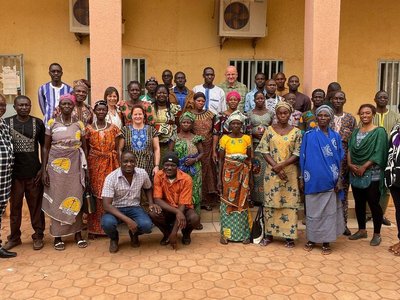

LoCaBreed2.0 is a follow-up of the previous project “Local cattle Breeds of Burkina Faso – Characterization and Sustainable Use (LoCaBreed)” implemented from 2016 to 2020.
LoCaBreed has been carried out by an international scientific network including two institutions in Austria which are the University of Natural Resources and Life Sciences (BOKU) and the University of Veterinary Medicine (Vetmeduni) Vienna, as well as three institutions in Burkina Faso: Norbert Zongo University, Nazi Boni University and the Agricultural and Environmental Research Institute (INERA).
LoCaBreed contributed to better conservation and sustainable use of local adapted cattle genetic resources in Burkina Faso through a deep genetic characterization of these resources and the implementation of sustainable breeding programs. In addition it strengthened the capacities of Burkina Faso institutions in animal breeding and genetics. Thus, three community-based local cattle breeding programs (CBBPs) have been set up and implemented in three communes in the South West of Burkina Faso to improve the Lobi cattle and crossbred (Zebu x Lobi) production performances. Three scholars have been completed their PhD studies at BOKU in animal breeding and genetics and in social sciences.
As an advancing academic partnership project, LoCaBreed2.0 aims to strengthen the achievements of LoCaBreed by reinforcing the current CBBPs and extending them to new farmers, new locations and other animal species. In this phase a special focus will be given to gender implications in animal breeding through the implementation of goat CBBPs with female farmers. In the area of capacity building three doctoral students will be trained, two in local institutions in animal breeding and genetics and one at BOKU in social and sciences who investigate gender and minorities inclusion in breeding programs.
Former scholars are highly involved in this academic partnership. The first project was initiated by Albert Soudre who was then and who is now the national project coordinator. Furthermore Dr. Dominique Ouédraogo and Dr. Bernadette Yougbaré who have graduated as part of LoCaBreed are now co-leaders of WP2 and WP4 related to the implementation of community-based breeding programs (CBBP) and the genomics studies respectively.
The kick-off meeting was an opportunity for scientists, stakeholders and farmers to discuss the outcomes of LoCaBreed and the planned activities of LoCaBreed2.0. A total of 20 farmers representatives including ten women attended the meeting. Dominique and Bernadette presented the results of their findings to farmers and the implications of these findings for the the sustainable breeding programs were discussed. All actors positively appreciated the achievements of the first phase and showed their engagement for the success of the second phase.
The project consortium is very grateful to their partners, farmers, policy makers and livestock extension workers for their commitment in this meeting and more globally for their trust in the process. Special thank is due to Dr. Okeyo Ally Mwai from the International Livestock Research Institute (Nairobi, Kenya) and Dr. Tadel Kahsa from Mekelle University of Ethiopia and also former OeAD scholoar for their collaboration and for coming to share their experience in the implementation of community-based breeding programs (CBBPs).
